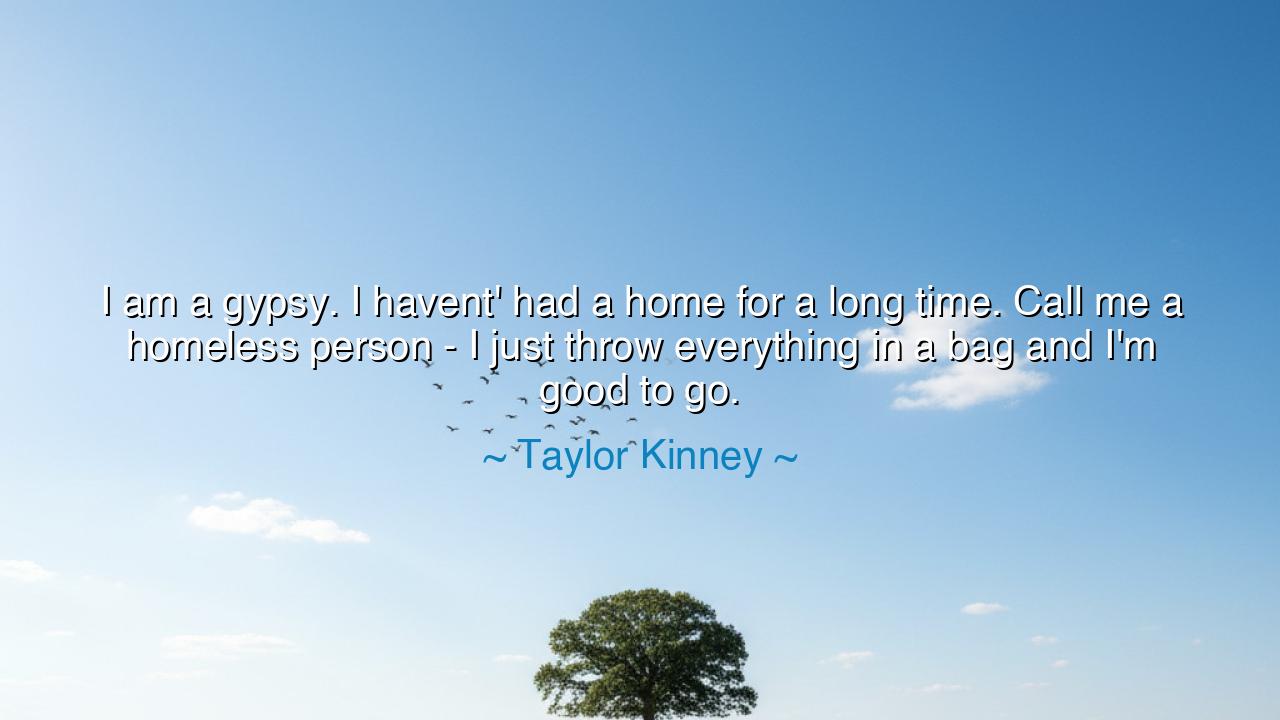
I am a gypsy. I havent' had a home for a long time. Call me a
I am a gypsy. I havent' had a home for a long time. Call me a homeless person - I just throw everything in a bag and I'm good to go.






The actor Taylor Kinney, known for his rugged spirit and restless heart, once said: “I am a gypsy. I haven’t had a home for a long time. Call me a homeless person — I just throw everything in a bag and I’m good to go.” Beneath these simple, wandering words lies the ancient truth of the nomadic soul — the one who belongs not to walls or cities, but to the vast and ever-changing journey of life itself. Kinney’s confession is not one of sorrow, but of freedom — the freedom to let go, to travel light, and to find meaning not in possessions or permanence, but in motion.
From the earliest ages of humankind, there have been those who walk the earth untethered — wanderers, pilgrims, and seekers — souls who know that home is not a place but a state of being. The ancient tribes moved with the seasons, the stars their ceiling, the horizon their destination. They were not lost, for they carried their belonging within. So too does Kinney, in the modern world, carry this same inheritance of the ancient traveler’s spirit. In his words we hear not discontent but courage — the courage to exist outside the walls of convention, to trust the road, and to believe that life itself provides all that one needs.
When he says, “I just throw everything in a bag and I’m good to go,” he speaks the language of detachment — a wisdom known to sages and adventurers alike. For what is a home, truly, if it becomes a prison for the soul? What are possessions if they weigh down the wings of the heart? The wise across generations have known that the less we cling, the more we see. Socrates himself owned little, walking barefoot through Athens, rich only in thought and freedom. And centuries later, Jack Kerouac would echo the same truth in his restless journey across America — that to live fully, one must sometimes abandon the illusion of security and embrace the open road.
Kinney’s words also carry the melancholy of the exile, for every wanderer knows the ache of distance — the longing for roots even as they chase the wind. To be a “gypsy,” as he calls himself, is to live between worlds — always arriving, never staying. It is to belong everywhere and nowhere at once. Yet this too is a kind of power, for those who walk alone come to see the world not through the narrow eyes of ownership, but through the vast eyes of experience. They understand that every sunrise, every stranger, every new landscape becomes, in its moment, home.
The origin of this quote lies in Kinney’s own life, one shaped by travel, change, and the pursuit of art. As an actor, he lives between roles, between places, between identities. His life mirrors that of the artist throughout history — the perpetual nomad, always in motion, always seeking the next expression of truth. From wandering minstrels of medieval times to poets like Rumi, who found God in movement rather than stillness, the creative spirit has forever been a traveler’s spirit. Kinney’s words, though modern, belong to this ancient lineage — a reminder that some are not meant to settle, but to move like rivers through the landscape of life.
But there is also a deeper reflection here: a challenge to our modern obsession with stability and ownership. In a world that measures success by accumulation, Kinney’s declaration is a rebellion — a call to simplicity. To throw everything into a bag and go is to trust oneself, to shed the unnecessary, and to remember that happiness cannot be built from things, but only from experience, presence, and freedom. His life is a mirror held up to those who have forgotten how to wander, who have traded adventure for comfort and curiosity for control.
And so the lesson of his words is this: learn to carry your home within you. Let your sense of belonging be tied not to a house or title, but to the strength of your heart and the openness of your mind. Travel, if not across lands, then across ideas and experiences. Be willing to move — to change, to explore, to begin again. For home is not found in the stillness of walls, but in the movement of the soul. Wherever you go, be fully there; wherever you stand, let gratitude make it sacred.
Thus, Taylor Kinney’s voice joins that of countless wanderers before him, whispering across the ages: “You are never truly homeless if you carry peace within you.” To be a gypsy of the heart is to live awake, unbound by fear, forever ready for the next sunrise. The world itself becomes your dwelling, the sky your roof, and every step your prayer. And when you live this way — light, fearless, and free — you discover that you were never searching for home at all. You were home, all along, wherever the road leads you.






AAdministratorAdministrator
Welcome, honored guests. Please leave a comment, we will respond soon